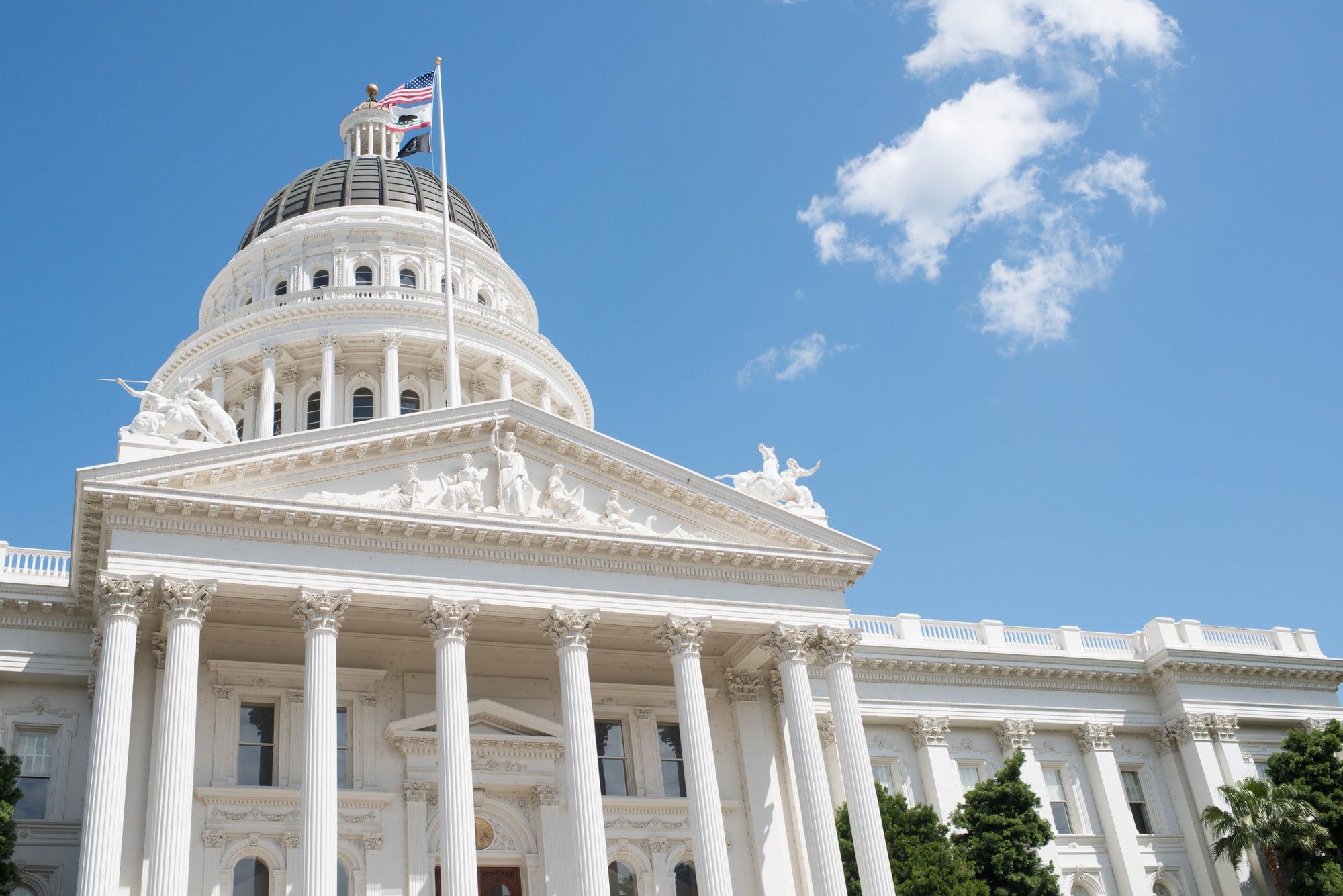Top Class Actions’s website and social media posts use affiliate links. If you make a purchase using such links, we may receive a commission, but it will not result in any additional charges to you. Please review our Affiliate Link Disclosure for more information.
California Gov. Gavin Newsom this week signed bills banning chokeholds and allowing the state to investigate police shootings amid ongoing calls for racial justice and an end to police brutality.
Police reform advocates and Democrats introduced a number of police brutality bills after the death of George Floyd at the hands of Minneapolis police in May, Politico reported.
Newsom signed a total of four bills into law Wednesday in an effort to reduce instances of police brutality in the state.
Chokeholds
Under AB1196, introduced by Assembly Member Mike A. Gipson, it is illegal for law enforcement agencies to authorize the use of a “carotid restraint,” or chokehold.
Previously under California law, officers were authorized to use “reasonable force” to make an arrest, prevent a suspect’s escape, or overcome resistance to the arrest.
The bill defines “carotid restraint” as “a vascular neck restraint or any similar restraint, hold, or other defensive tactic in which pressure is applied to the sides of a person’s neck that involves a substantial risk of restricting blood flow and may render the person unconscious in order to subdue or control the person.”
A chokehold is “any defensive tactic or force option in which direct pressure is applied to a person’s trachea or windpipe.”
Use-of-Force Investigations
Newsom also signed AB1506, introduced by Assembly Member Kevin McCarty.
The new law creates a division within the Department of Justice to review law enforcement agencies’ use-of-force policies at the agency’s request.
It also requires a state prosecutor to investigate officer-involved shootings that result in an unarmed civilian’s death.
The written results of any such investigation will be available publicly online.

“This has been an effort before George Floyd, but the murder of George Floyd before our eyes put these issues in the spotlight, and it allowed us to get bipartisan support.” McCarty said, according to Politico.
Sheriff Oversight
AB1185, also introduced by Assembly Member McCarty, authorizes counties to establish a sheriff oversight board, which will assist the board of supervisors with duties relating to the sheriff.
The sheriff oversight board can be established through board of supervisors action or with a vote by county residents.
The chairperson of the oversight board, along with the inspector general, will be able to issue subpoenas when needed during the course of an investigation.
Under existing law, the sheriff was authorized to “sponsor, supervise, or participate in any project of crime prevention, rehabilitation of persons previously convicted of crime, or the suppression of delinquency.”
A board of supervisors monitors county officers’ conduct to ensure they’re “faithfully” performing their duties.
Job Descriptions
AB846, which was introduced by Assembly Member Autumn Burke, requires that the Commission on Peace Officer Standards and Training review and update its regulations and screening materials in order to identify “explicit and implicit bias against race or ethnicity, gender, nationality, religion, disability, or sexual orientation related to emotional and mental condition evaluations.”
It also requires every department or agency employing peace officers to review job descriptions used during the recruitment and hiring process and “to make changes that deemphasize the paramilitary aspects of the job,” placing greater emphasis on community interaction and problem solving.
Peace officers in California already are required to a set of minimum standards, including evaluation by a physician or surgeon and a psychologist to determine they don’t have any physical, emotional, or mental conditions that could negatively affect their ability to perform in their official capacity.
Looking Ahead
According to Politico, California legislative leaders have committed to prioritizing police reform in 2021; six bills died at the end of the current session.
Among the most contentious was SB731, introduced by Sen. Steve Bradford.
Bradford’s bill would have established a system for decertifying officers who commit serious offenses while in the line of duty.
Agencies employing peace officers would have been required to report “the employment, appointment, or separation from employment of a peace officer, any complaint, charge, allegation, or investigation into the conduct of a peace officer that could render the officer subject to revocation, findings by civil oversight entities, and civil judgements [sic] that could affect the officer’s certification.”
In addition, all records related to the badge revocation would be made public and kept for 30 years.
California is one of five states that don’t have a way to pull the badge of an officer who has committed a crime, Politico reported.
What do you think of the new California laws intended to combat police brutality? Do you think police brutality laws need to be stricter? Let us know in the comments.
Read About More Class Action Lawsuits & Class Action Settlements:
Lawsuit Alleges Police Brutality at Las Vegas BLM Protest
Four Arrested During Kenosha Police Brutality Protest File Class Action Lawsuit
















One thought on California Governor Signs Bill Banning Chokeholds
So far all the changes are decorative and have no teeth. Before we continue to place new policies on departments lets get them to be held accountable for the ones that are currently in place to protect the citizens and are consistently snubbed by law enforcement.
I have attempted to hold accountable, or get an agency to follow through with request that were laws or policy that are to change police brutality, false arrests, and safety of our communities . Often my past history of incarceration is used, failure to follow protocol, the classification of an ” expert ” status, and the legal teams that represent police force still makes presumption of innocence a fantasy commodity that I cannot obtain. In the last two years I have suffered from police abuse. Having been arrested in every decade of my life and many times for bogus charges I can say that I have “comprehensive and authoritative knowledge of or skill in a particular area”. Being recepient of suspect/defendant events spanning over 40 years I should not be snubbed. Yet repeatedly the following are not luxuries I can benefit from:
1. The right to be free from unwanted search and seizure.
2. The right to be mirandized and to exercise those rights without hardship, pressure, or physical abuse.
3. The right to have a jury of my peers hear my case, have my consitutuional rights first afforded to me prior to judicial officers making a decision that I am guilty therefore refusing to allow equal protection in which a natural citizens expect.
4. The right to have my past history excluded in the manner in which I am treated upon an police encounter. A method we define has profiling.
5. The right to prove that injuries are not only physical, but emotional, mental, professional, and spiritual when I have my rights denied first by officers and then by a system that rewards police misconduct on all levels.
While we recognized that there was problem in our system we initiated the following that I have attempted to utilize.
1. The right not to be a victim of Racial and Identity Profiling. I have been arrested two in the last 2 years where profiling changed my status from victim to defendant and according to officers arrested me for resisting arrest for refusing to stop using my phone to tape a routine traffic stop for tinted windows and was asked to step out of the vehicle prior to any request for CDL and insurance. AB 953 non existent.
2. The use of the Public Records Act has been refused by police stations and high powered attorneys to disclose past conduct of officers that fabricated evidence or destroyed evidence by omission.
3.The lack of identifying procedure or process how internal affairs handles complaints. One complaint filed the agency never sent any progress on investigation has stipulated in the correspondence I received immediately after submitting complaint. Several months later I wrote a letter to the chief of police inquiring about their follow through on policy. Months later a letter that the complaint was being closed was sent to notify me of the the action. The letter stated a complete and thorough investigation had been conducted. Yet, not one phone call was ever made to the primary witness, complatintant, and witnesses for additional information was completed. When asked for the process in which the investigation was done I was told that was not information that needed to be disclosed.
3. Police webcam footage is never available. I was arrested for resisting for video taping an traffic stop for tinted windows. In the video the officer is telling me that I was on webcam and no additional taping was needed.
4. The violation of rights is never enough to hold an officer accountable. In order to have legal representation I must have severe physical injuries before any attorney will assist.
5. The Attorney General has refused to follow through on holding agencies accountable for not disclosing information as directed and/or allowing blatant laws to go unprosecuted. Case in point the Orange County Sheriff Lab debacle.
6. Police Unions have attorneys on retainer to defend police misconduct and citizens cannot get representation to defend rights that should never have been violated.
There is more just comical that we have new policies that lack the potential of having teeth, they are just dentures, cosmetic.